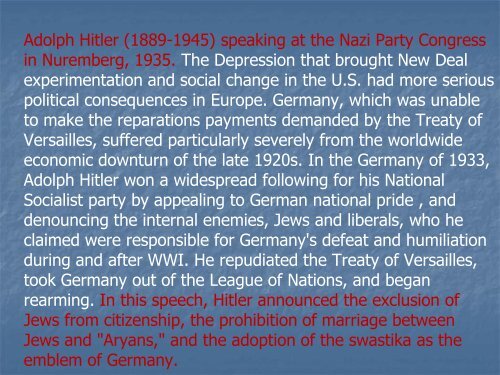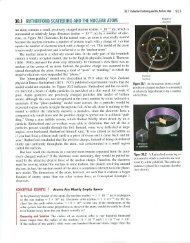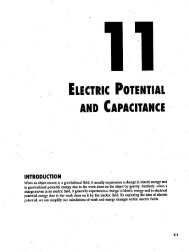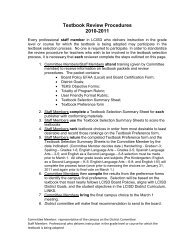Chapter 31 Section 3 Fascism Rises in Europe
Chapter 31 Section 3 Fascism Rises in Europe
Chapter 31 Section 3 Fascism Rises in Europe
You also want an ePaper? Increase the reach of your titles
YUMPU automatically turns print PDFs into web optimized ePapers that Google loves.
Adolph Hitler (1889-1945) speak<strong>in</strong>g at the Nazi Party Congress<br />
<strong>in</strong> Nuremberg, 1935. The Depression that brought New Deal<br />
experimentation and social change <strong>in</strong> the U.S. had more serious<br />
political consequences <strong>in</strong> <strong>Europe</strong>. Germany, which was unable<br />
to make the reparations payments demanded by the Treaty of<br />
Versailles, suffered particularly severely from the worldwide<br />
economic downturn of the late 1920s. In the Germany of 1933,<br />
Adolph Hitler won a widespread follow<strong>in</strong>g for his National<br />
Socialist party by appeal<strong>in</strong>g to German national pride , and<br />
denounc<strong>in</strong>g the <strong>in</strong>ternal enemies, Jews and liberals, who he<br />
claimed were responsible for Germany's defeat and humiliation<br />
dur<strong>in</strong>g and after WWI. He repudiated the Treaty of Versailles,<br />
took Germany out of the League of Nations, and began<br />
rearm<strong>in</strong>g. In this speech, Hitler announced the exclusion of<br />
Jews from citizenship, the prohibition of marriage between<br />
Jews and "Aryans," and the adoption of the swastika as the<br />
emblem of Germany.










